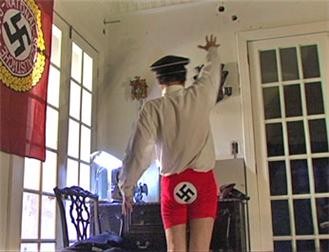Yoshua Okón
30 Oct 2010 - 06 Feb 2011
YOSHUA OKÓN
2007-2010
Sat, Oct 30, 2010 – Sun, Feb 6, 2011
Gallery 2
Yoshua Okón's video installations are built on improvisational narratives created by the artist and his collaborators, mostly non-actors willing to participate in a game of social chance that may easily spiral out of control. Centered around emotionally charged expressions of power and contemplations of fear, death, sex and nationhood, these works provoke viewers to consider questions of social conduct and the behavior of individuals within systems of social restraint. Okón further challenges viewers to question their own attitudes towards power, ethics and prejudice, particularly as they relate to class and race. Maintaining a belief that humanity holds within its grasp a complex web of fears and desires, Okón places psychological violence on the stage with absurdity and humor. The rather serious antics that unfold yield to audience reactions of shock or disbelief, while at the same time providing a space to laugh at one's own frailties. Okón's works are both performative and interactive, in that they are not complete without the participation and complicity of the audience as they react to what they experience on screen.
Among the works included in the exhibition are Bocanegra (2005-2007), in which Okón collaborated with a group of Nazi enthusiasts who dressed up in vintage uniforms and were recorded in a variety of orchestrated situations; Canned Laughter (2009), a simulation of a maquiladora (a factory on the northern border of Mexico) that "cans laughter," juxtaposing the spontaneity of emotion with the grim realities of contemporary industry; House Meister (2008), in which a man comes out of a mouse-hole-like opening in the wall and crawls on the ground hissing and growling; Hipnostasis (2009), a collaboration with Raymond Pettibon which explores the subculture of old hippies and beach bums from Venice Beach; and Rusos Blancos (White Russians) (2008), a collaboration involving a family and residents of a remote desert area in California who rehearse performances for invited spectators.
2007-2010
Sat, Oct 30, 2010 – Sun, Feb 6, 2011
Gallery 2
Yoshua Okón's video installations are built on improvisational narratives created by the artist and his collaborators, mostly non-actors willing to participate in a game of social chance that may easily spiral out of control. Centered around emotionally charged expressions of power and contemplations of fear, death, sex and nationhood, these works provoke viewers to consider questions of social conduct and the behavior of individuals within systems of social restraint. Okón further challenges viewers to question their own attitudes towards power, ethics and prejudice, particularly as they relate to class and race. Maintaining a belief that humanity holds within its grasp a complex web of fears and desires, Okón places psychological violence on the stage with absurdity and humor. The rather serious antics that unfold yield to audience reactions of shock or disbelief, while at the same time providing a space to laugh at one's own frailties. Okón's works are both performative and interactive, in that they are not complete without the participation and complicity of the audience as they react to what they experience on screen.
Among the works included in the exhibition are Bocanegra (2005-2007), in which Okón collaborated with a group of Nazi enthusiasts who dressed up in vintage uniforms and were recorded in a variety of orchestrated situations; Canned Laughter (2009), a simulation of a maquiladora (a factory on the northern border of Mexico) that "cans laughter," juxtaposing the spontaneity of emotion with the grim realities of contemporary industry; House Meister (2008), in which a man comes out of a mouse-hole-like opening in the wall and crawls on the ground hissing and growling; Hipnostasis (2009), a collaboration with Raymond Pettibon which explores the subculture of old hippies and beach bums from Venice Beach; and Rusos Blancos (White Russians) (2008), a collaboration involving a family and residents of a remote desert area in California who rehearse performances for invited spectators.

